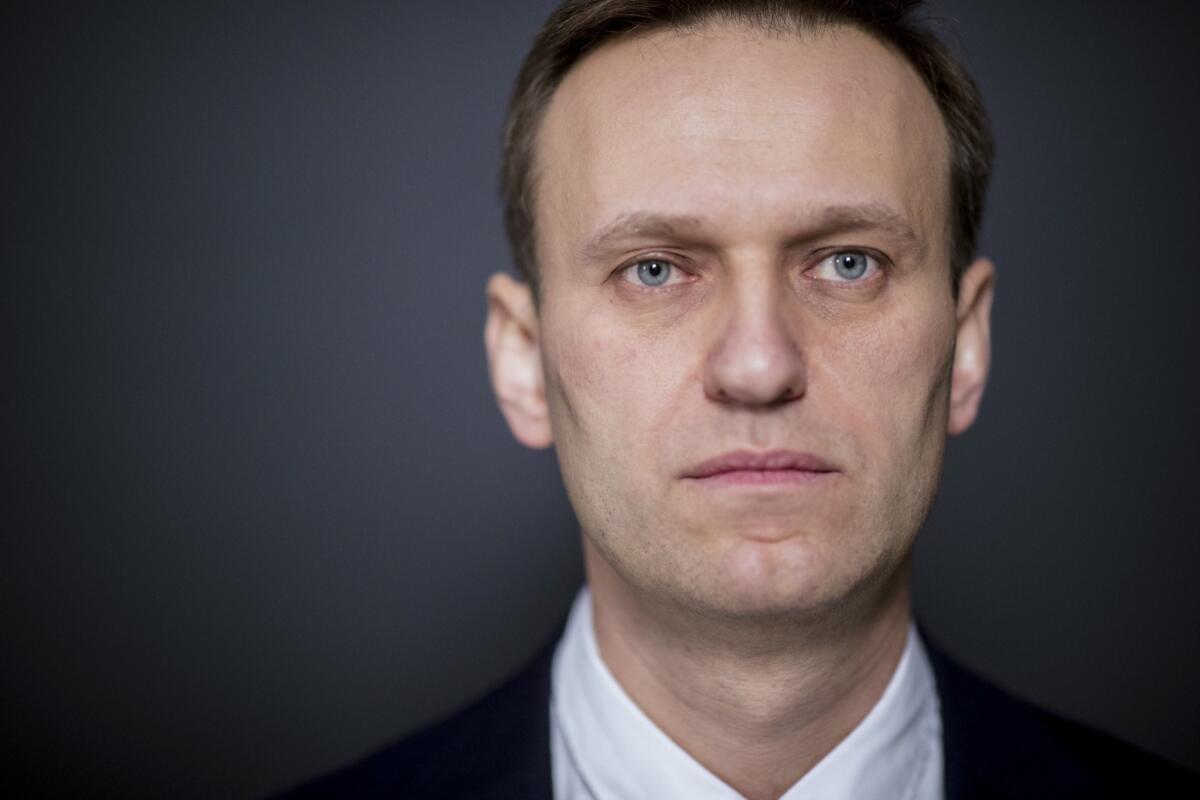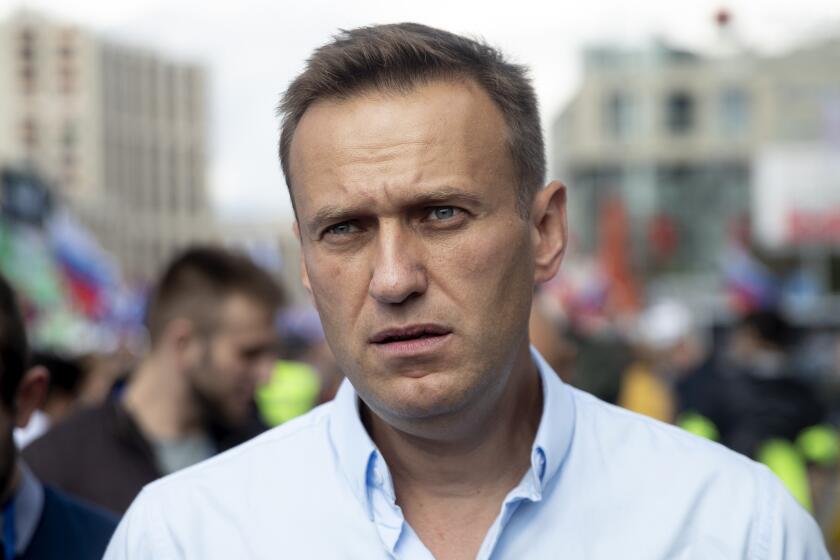Who wanted Russian opposition leader Alexei Navalny dead?

- Share via
MOSCOW — Alexei Navalny’s visit to Siberia last week went like most of the trips he has taken across the country to galvanize anger against President Vladimir Putin. Russia’s most popular opposition leader posed for selfies with supporters, took a dip in the Tom River, and evaded a conspicuous tail from Russian secret services.
On the flight back to Moscow, Navalny abruptly broke out in a sweat, became disoriented and collapsed in the plane’s bathroom, where he could be heard groaning in pain before he lost consciousness. A week later, he remains in a coma after being evacuated to Berlin, where doctors said test results suggested he had been poisoned with a cholinesterase inhibitor, whose uses range from medicines and pesticides to nerve agents.
The attack on Navalny — at least the sixth such attempt against a Russian dissident in the last five years — has provoked international condemnation on a scale not seen since the poisoning of former double agent Sergei Skripal with the nerve agent Novichok in the U.K. in 2018.
Russia contends that it found no evidence Navalny was poisoned and has dismissed accusations of state involvement as “empty noise.” Although Navalny’s allies point the finger squarely at the Kremlin, the activist has built up a long list of powerful enemies.
“It’s essentially an attempt to remove him as a threat. They consider this with a classic KGB mentality: ‘no man, no problem,’” said Vladimir Milov, a former Russian deputy energy minister who advises Navalny.
“By removing him personally, they aim to kill the brand and end the team. . . . [But] it’s a grave mistake by the Kremlin to think that without him the movement stops,” he added.
Constant threats
In a decade of activism, Navalny, 44, has mounted a remarkable challenge to Putin despite constant hostility from the state. After finding himself largely shut out from Russia’s state-dominated media, the activist built a huge audience on YouTube with viral anti-corruption investigations that he then leveraged to organize the largest protests in Russia’s modern history.
In 2012, when Navalny led a series of protests against Putin’s return to the Kremlin, supporters asked him: “Why do you think you’re not being killed and what happens if you are?” according to Sergei Guriev, a professor at Sciences Po in Paris and former Kremlin advisor.
Navalny’s reply, he said, “was that ‘it’s a dangerous place, and that’s why I’m talking to you — in the hope you can work on our common cause.’ So this was something he already had in mind.”
As Navalny’s popularity grew, so did state efforts to stop him. He has been jailed 13 times for protesting against Putin and was sentenced to six years in prison in 2013 on embezzlement charges.
The legal pressure has been coupled in recent years with a series of brutal physical attacks. In 2017, a pro-Kremlin activist threw a chemical substance at Navalny that blinded him in one eye, and the activist also believes he was poisoned during one of his many jail stints last year.
Past example shows that falling afoul of Putin can portend poison peril
Navalny’s visit to Siberia last week was an attempt to boost his new “smart voting” campaign urging supporters to vote tactically against Putin’s United Russia party in September’s regional elections. Navalny says the tactical voting strategy cost United Russia nearly half the seats on Moscow’s city council in elections last year.
Guriev, now an informal advisor to Navalny, said “smart voting” is a particular nuisance for the Kremlin. Russia’s stagnant economy and Putin’s patchy response to the pandemic sent his approval ratings to record lows this year before a recent rebound. A June survey by the Levada Center, an independent pollster, found Navalny was Russia’s second most “inspirational” politician, after the president.
If the strategy is successful, Guriev said, Navalny could help bring to power politicians from within the Kremlin’s approved slate of spoiler parties who become magnets for discontent.
Navalny has backed protests in the far eastern city of Khabarovsk over the arrest of popular “systemic opposition” Gov. Sergei Furgal and raised the specter of more losses for United Russia in future votes.
“He’s the only threat the ruling party is facing,” Guriev said.
Milov also pointed to the speed with which dissent gathered ground online in neighboring Belarus, where almost three weeks of mass protests against the 26-year authoritarian rule of Russia-backed Alexander Lukashenko has spooked the Kremlin.
Little-known blogger Sergei Tikhanovsky quickly built a YouTube following with trips across the country clearly modeled on Navalny’s approach. When he was arrested, his wife, Svetlana, Tikhanovskaya ran in his stead and became the focal point for the protests.
“Look at Belarus. It is a YouTube revolution. Tikhanovskaya is the Belarusian Navalny,” added Milov.
Defensive mode
Whereas Russia denied involvement in the Skripal case with a nod and a wink, Navalny’s poisoning has put the Kremlin on the defensive. Russian police say his test results show no traces of poison, and have declined to open a criminal investigation, adding that security cameras turned up nothing suspicious — despite a pervasive surveillance operation throughout the trip.
In an effort to deprive him of exposure, Dmitry Peskov, Putin’s spokesman, only refers to Navalny as “the patient” at news conferences, refusing to say his name.
Displeasure with Navalny’s activity has often come from the Kremlin-friendly oligarchs named in his anti-corruption investigations. Alisher Usmanov, a billionaire metals and technology tycoon, was the subject of a 2017 investigation by Navalny that suggested he had given lavish gifts to then-Prime Minister Dmitry Medvedev.
In response, Usmanov posted two videos on social media addressed to “Alexei-damn-you-loser-Navalny” in which the billionaire said: “I spit on you.” He later won a court case against Navalny ordering the video investigation to be removed from the internet.
“I don’t consider Navalny a political figure,” Usmanov told the Financial Times in an interview earlier this year. “First of all, he is a puppet, of those who bought him, and created him. Second of all, he was telling lies.”
Yevgeny Prigozhin, who is sanctioned by the U.S. for alleged activities that span from an infamous St. Petersburg troll farm to mercenary activity in Africa, said this week he intended to enforce a court ruling that Navalny’s foundation must pay $1.2 million of debt owed to his company. He will take on the debt personally, he said, and “strip this group of dishonest people naked.”
Despite Navalny’s long list of enemies, Russian officials said in the days following his poisoning that he was a greater threat to the Kremlin in a coma — following an attack that many would blame on the state — than alive and on YouTube.
“He really got under the skin of people who have big country houses and lavish mansions, but I wouldn’t say he was such a threat to the regime that it had to bump him off,” a person who regularly speaks to senior Kremlin officials said.
“If there isn’t a convincing public investigation, the opposition will point the finger at the authorities. If they weren’t involved, it shouldn’t be hard to get to the bottom of it and find some sort of scapegoat, and that could be absolutely anyone. There are a fair number of crazy people sitting in the woods with grenade launchers,” the person said.
“But it’s definitely not Putin and it’s definitely not the government,” the person added, pausing briefly, “at least I hope so. That would really be beyond the pale.”
Vladimir Ashurkov, executive director of Navalny’s foundation, said the failure to investigate the two previous attacks means the Kremlin should take responsibility for the poisoning even if it was not directly involved.
“We don’t know for sure whether it was personally ordered by Putin. But we understand that he created the conditions where this can happen and the people responsible won’t be punished or suffer any repercussions,” he said.
European concern
Navalny had been hospitalized for just a few hours when the European Union’s two most powerful leaders demanded Moscow launch a full investigation.
Angela Merkel, the German chancellor, and French President Emmanuel Macron stood side by side at a news conference to offer Navalny medical services and asylum.
Within 24 hours the Russian doctors treating him backed down from their insistence that he was not safe to travel — which Navalny’s family says was a stalling tactic to stop the poisoning from being diagnosed — and he was flown to Berlin on a private jet arranged by a German nongovernmental organization last Saturday.
As Moscow dragged its heels on an investigation, Navalny’s supporters have relied on international pressure on the Kremlin. It was only on Wednesday — almost a week after Navalny was poisoned — that the Kremlin finally called for a “thorough and objective investigation” in a statement following a call between Putin and Italian Prime Minister Giuseppe Conte.
Few of Navalny’s supporters expect the preliminary investigation to amount to much. Police declined to investigate the apparent poisonings of Pyotr Verzilov, a dissident artist, and the activist Vladimir Kara-Murza, a friend of Navalny, who survived two attempts on his life.
Vyacheslav Volodin, Russia’s parliamentary speaker, said he would lead a separate investigation to determine whether the poisoning was “an attempt by foreign powers to harm the health of a Russian citizen with the aims of creating tensions within Russia and making yet more accusations against our country.”
While Navalny remains in a coma, his team is soldiering on with the smart-voting campaign. His regular jail stints and the year he spent under house arrest while on trial in 2014 helped the foundation learn to cope with his absences, Ashurkov said, and aides are working to finish the investigation he was filming in Siberia.
Friends said the poisoning will only harden Navalny’s resolve and lead him to reject Germany’s offer of asylum.
“I can give you 120% that he will never do that. He will stay in Russia and continue to do what he does,” Kara-Murza said. “The biggest gift we could give to those people in the Kremlin is if we got up and ran.”
© The Financial Times Ltd. 2020. All rights reserved. FT and Financial Times are trademarks of the Financial Times Ltd. Not to be redistributed, copied or modified in any way.
More to Read
Sign up for Essential California
The most important California stories and recommendations in your inbox every morning.
You may occasionally receive promotional content from the Los Angeles Times.














